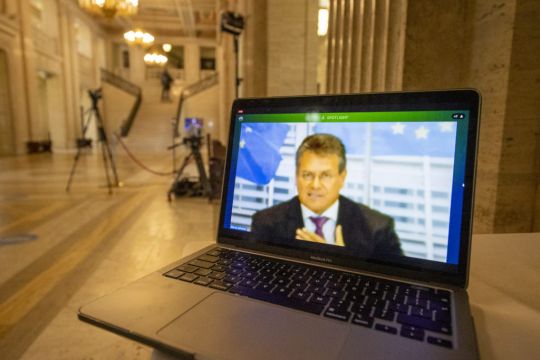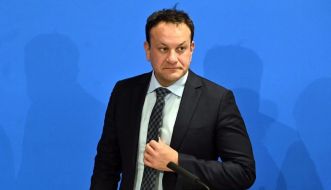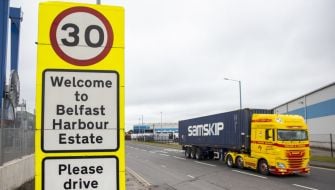The EU is prepared to consider “bold steps” to reduce checks required under Brexit’s Irish Sea border to an “absolute minimum”, the European Commission vice president has said.
Giving evidence to a special sitting of a Northern Ireland Assembly committee, Maros Sefcovic said the EU was willing to accommodate permanent flexibilities to the contentious Northern Ireland protocol, but he said the UK had to reciprocate by demonstrating a commitment to the “full and faithful” implementation of the arrangements.
The appearance of the EU’s chief negotiator on Brexit before MLAs comes amid continuing dispute over the protocol, which has created economic barriers between the North and Britain.
The arrangements, which were agreed by the EU and UK as a way to keep the Border on the island of Ireland free-flowing, have introduced a series of new checks and restrictions on goods moving from Britain into Northern Ireland.
Our approach has been, and still is, solution-oriented, constructive and flexible
Technical talks are ongoing between London and Brussels to try to hammer out ways to reduce the burden of red tape.
Mr Sefcovic said there was a need to “de-dramatise” the rhetoric around the Protocol.
“We are willing to consider taking bold steps if the UK Government demonstrates a clear and concrete commitment to implementing the protocol in full,” he said.
A prohibition on GB chilled meats entering Northern Ireland is due to come into force later this week, though the EU has indicated a willingness to grant a UK request to extend a temporary exemption period for a further three months to provide space to find an alternative solution.
Solution
During his virtual appearance, Mr Sefcovic told MLAs he was not in a position to formally confirm the granting of the extension, but said he was “confident” a solution would be found in the next 48 hours.
He said the Protocol emerged from the long Brexit withdrawal negotiations as the “only possible solution” to keep the Irish land border free-flowing.

The senior European official said since then there had been no viable alternative put forward.
“Nobody has yet suggested a better workable alternative,” he said.
“The Protocol needs to be fully and correctly implemented, and at the same time our approach has been, and still is, solution-oriented, constructive and flexible.
“The Protocol is a unique solution that the EU has never offered before. We are outsourcing the control of part of our border to a third country.
“The EU has demonstrated the pragmatism we are occasionally and wrongly accused of lacking. We have spared no efforts in trying to mitigate problems that have arisen in the implementation of the Protocol and have explored and put on the table practical and permanent solutions.”
Mr Sefcovic said a Swiss-style deal on agri-food shipments from Great Britain to Northern Ireland would do away with the “vast majority” of new checks.
The agreement the EU has with Switzerland avoids animal and plant health checks because the Swiss align their own regulations with the bloc’s.
When the EU changes its rules, the Swiss change theirs to ensure continued alignment.
“I want to see necessary checks reduced to absolute minimum possible,” said Mr Sefcovic.

“To mention one measure that would address some concerns and could be negotiated very quickly – a so-called Swiss-style veterinarian agreement with the UK continuing to apply EU SPS (sanitary and phytosanitary) rules will do away with the vast majority of the checks in the Irish Sea and would not require checks elsewhere, say in Northern Ireland, including for travels with pets, for example.”
Mr Sefcovic said a New Zealand-style deal would not do away with as many checks.
The EU and New Zealand agreement involves both parties mutually recognising that the other has high food safety standards. This reduces the proportion of checks required but allows New Zealand to continue to set its own SPS regulations.







